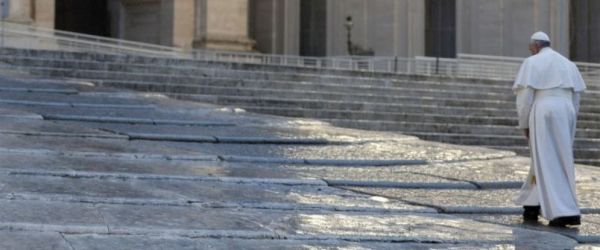Today, Jesus invites us to reflect on two opposing ways of life: the way of the world and that of the Gospel — the worldly spirit is not the spirit of Jesus — and He does so by recounting the parable of the unfaithful and corrupt steward, who is praised by Jesus, despite his dishonesty (cf. Lk 16:1-13). We must point out immediately that this administrator is not presented as a model to follow, but as an example of deceitfulness. This man is accused of mismanaging his master’s affairs, and before being removed, astutely he tries to ingratiate himself with the debtors, condoning part of their debt so as to ensure himself a future. Commenting on this behaviour, Jesus observes: “For the sons of this world are wiser in their own generation than the sons of light” (v. 8).
We are called to respond to this worldly astuteness with Christian astuteness, which is a gift of the Holy Spirit. This is a matter of departing from the worldly spirit and values, which the devil really favours, in order to live according to the Gospel. How is worldliness manifested? Worldliness is manifested by attitudes of corruption, deception, subjugation, and it constitutes the most ill-chosen road, the road of sin, because one leads you to the other! It’s like a chain, even if — it’s true — it is generally the easiest road to travel. Instead, the spirit of the Gospel requires a serious lifestyle — serious but joyful, full of joy! — serious and challenging, marked by honesty, fairness, respect for others and their dignity, and a sense of duty. And this is Christian astuteness!
The journey of life necessarily involves a choice between two roads: between honesty and dishonesty, between fidelity and infidelity, between selfishness and altruism, between good and evil. You can not waver between one and the other, because they move on different and conflicting forms of logic. The prophet Elijah said to the people of Israel that went on these two roads: “You are limping with both feet!” (cf. 1 Kings 18:21). It’s a fine image. It is important to decide which direction to take and then, once you have chosen the right one, to walk it with enthusiasm and determination, trusting in God’s grace and the support of His Spirit. The conclusion of the Gospel passage is powerful and categorical: “No servant can serve two masters; for either he will hate the one and love the other, or he will be devoted to the one and despise the other” (Lk 16:13).
With this teaching, Jesus today urges us to make a clear choice between Him and the worldly spirit, between the logic of corruption, of the abuse of power and greed, and that of righteousness, meekness and sharing. Some people conduct themselves with corruption as they do with drugs: they think they can use it and stop when they want. It starts out small: a tip here, a bribe over there.... And between this and that, one’s freedom is slowly lost. Corruption is also habit-forming, and generates poverty, exploitation, and suffering. How many victims there are in the world today! How many victims of this widespread corruption. But when we try to follow the Gospel logic of integrity, clarity in intentions and in behaviour, of fraternity, we become artisans of justice and we open horizons of hope for humanity. In gratuitousness and by giving of ourselves to our brothers and sisters, we serve the right master: God.
May the Virgin Mary help us to choose at every opportunity and at all costs, the right way, even finding the courage to go against the tide, in order to follow Jesus and his Gospel.
[Pope Francis, Angelus 18 September 2016]












